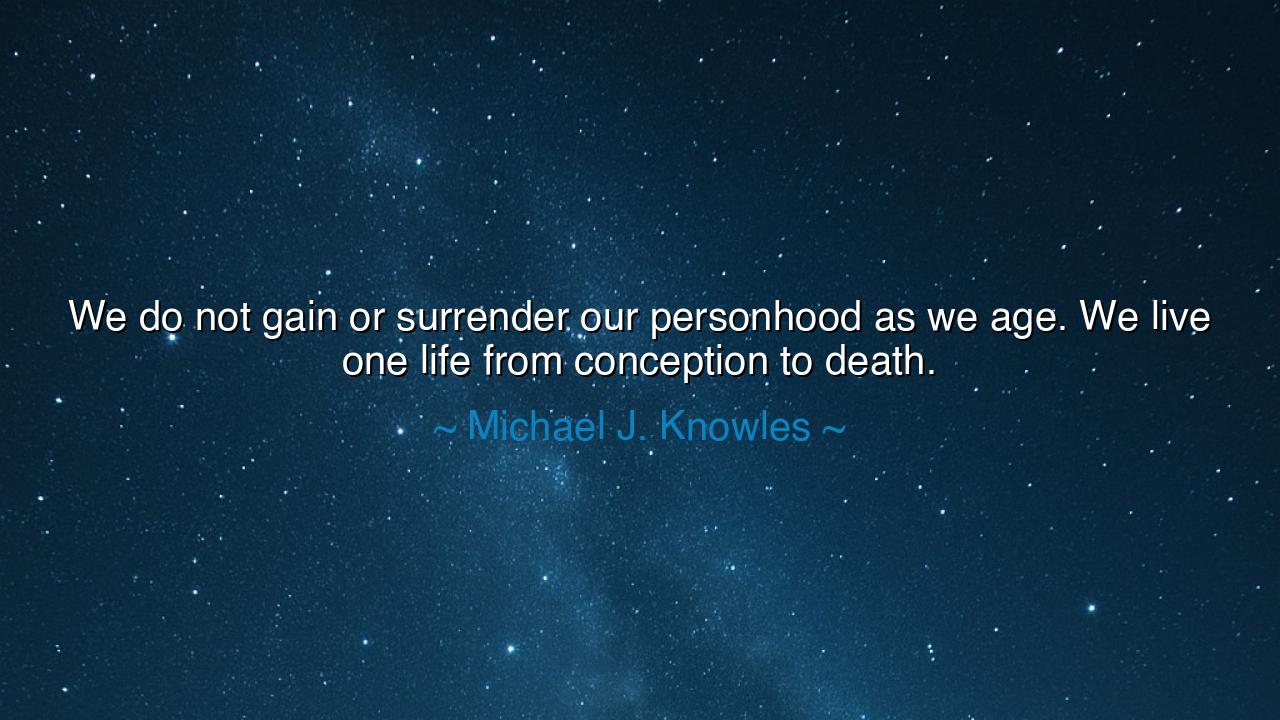
We do not gain or surrender our personhood as we age. We live one
We do not gain or surrender our personhood as we age. We live one life from conception to death.






The thinker and moral philosopher Michael J. Knowles once declared: “We do not gain or surrender our personhood as we age. We live one life from conception to death.” In this statement lies a truth as ancient as creation itself — the truth that human dignity is unchanging, that the worth of a soul is not measured by its strength, its knowledge, or its usefulness, but by the simple, eternal fact of its being. His words rise like a shield against a world that often forgets the sacredness of life — a world that celebrates youth but neglects the old, that defends the powerful but overlooks the weak. In this quote, Knowles reminds us that the human journey, from the first breath to the last, is one continuous and sacred flame, unbroken and indivisible.
The origin of this quote springs from a deep philosophical and moral reflection on the nature of personhood — a topic that lies at the heart of debates over life, dignity, and the value of the human being. In his time, Knowles spoke often about the temptation of modern society to divide life into stages of worth: to say that one is “not yet” a person before birth, or “no longer” one in old age or illness. Against this false reasoning, he raised the ancient truth: that the soul does not appear and disappear by degrees. From the spark of conception to the final breath, the human being is whole — not a collection of phases, but a single, unfolding story. To deny that truth is to wound not only others, but the moral heart of civilization itself.
In this, his thought echoes the wisdom of the ancients. The Stoics, the Christians, and even the philosophers of the East all held that life possesses inherent sanctity, not because of what it achieves, but because of what it is. The newborn child, though helpless, carries the same essence as the elder whose body bends under the weight of time. The one who struggles in the silence of disability or decline is no less a bearer of the divine image than the athlete or the king. Knowles’ words call us back to this forgotten reverence, reminding us that to measure human worth by utility or independence is to mistake the very nature of being.
Consider the story of Helen Keller, born deaf and blind into a world that once believed such disabilities stripped a person of purpose. Yet through the love of her teacher Anne Sullivan, Helen’s mind and soul emerged into brilliance. She learned to read, to speak, to think, to inspire — and in doing so, she shattered the illusion that the disabled are somehow “less human.” Her life testified to what Knowles teaches: that personhood is not granted by ability, nor withdrawn by limitation. It is not given by society, nor taken by circumstance. It is inherent, permanent, woven into the fabric of existence itself.
Knowles’ message also bears a warning for the modern heart, which too often confuses progress with wisdom. In an age of science and convenience, we begin to treat life as something we manage rather than revere — something to edit, extend, or end at will. But when humanity forgets that life is sacred from beginning to end, it loses its moral compass. To see personhood as negotiable is to open the door to cruelty — to the abandonment of the unborn, the forgotten elderly, and all who cannot defend themselves. His words cry out against this moral blindness, declaring that every life is a thread in the same divine tapestry, and when one is cut, the pattern itself unravels.
The meaning of his quote, therefore, is both profound and urgent. To live “one life from conception to death” is to recognize that our existence is a journey of continuity — that the infant, the youth, the adult, and the elder are not different beings, but the same soul at different stations of its pilgrimage. The child you once were still lives within you, and the aged person you will become is already taking shape. To honor others at every stage of life is to honor that truth within yourself. For when we see each human life as sacred and unbroken, compassion becomes our natural law, and justice becomes our way of being.
The lesson is clear: guard the dignity of life in all its forms. Do not despise weakness, for it is the mirror of your own humanity. Do not exalt strength, for it fades like the sun at dusk. Treat every person — from the smallest to the frailest — as a bearer of infinite worth. And in yourself, remember that your value has never depended on your success, your youth, or your power. It is written in the eternal language of being — the language of the soul that knows neither beginning nor end in the eyes of God.
Thus remember, O guardian of life, that to live wisely is to see the sacred in all ages. Rejoice in the strength of youth, honor the wisdom of age, and protect the innocence of the unborn and the frail. For we do not rise and fall in worth as time passes — we simply unfold the mystery of what we already are. From conception to death, one life, one spirit, one unbroken dignity — that is the truth Knowles bequeaths to those who would see the divine in every beating heart.






AAdministratorAdministrator
Welcome, honored guests. Please leave a comment, we will respond soon